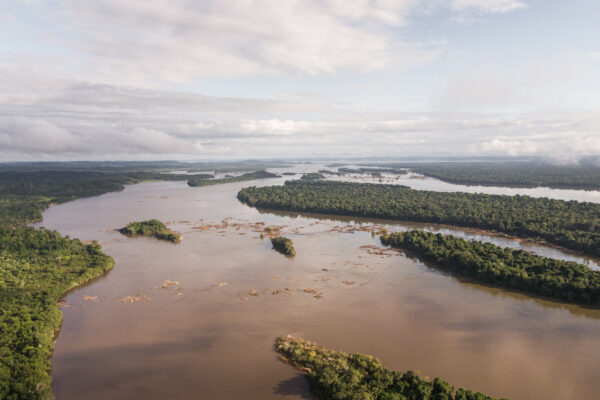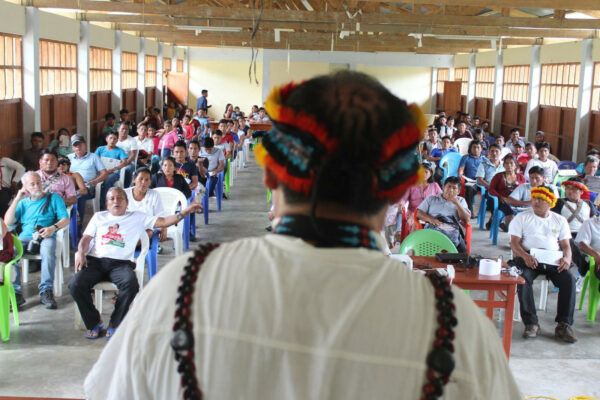Washington D.C – A heavily-touted environmental and social impact assessment commissioned by the Inter-American Development Bank (IDB) to justify the expansion of the controversial Camisea gas project in a highly sensitive part of the Peruvian Amazon appears to omit fundamental criteria including damage done to biodiversity and health impacts on indigenous communities, it emerged yesterday.
Instead, the 300-page document, produced by environmental and policy consultants ICF, based in Fairfax, Virginia, assesses environmental and social performance based on ‘management indicators.’ As a result, it fails to look at alleged health and human rights abuses against the vulnerable native communities of the Lower Urubamba river basin of southern Peru, on whose ancestral lands Camisea is located, or give any concrete findings about the impacts on the area’s unique and fragile ecosystem, identified by the Smithsonian Institution as a world biodiversity hotspot.
The revelations came during a public hearing at the IDB’s headquarters in Washington D.C. on Monday intended to give environmental and human rights groups a chance to discuss their concerns regarding Camisea with Bank executives. On several occasions, ICF Project Manager Alejandro Fernandez and IDB officials declined to answer questions on the basis that they did not come under the report’s purview.
Asked by Environmental Defense to summarize the biodiversity impacts of Camisea, Mr. Fernandez appeared to wash ICF’s hands of any responsibility for assessing the harm caused to the flora and fauna of the Lower Urubamba, responding: “Biodiversity indicators will be identified. A program was established to handle that subject. The program is in process and the question cannot be answered. The audit just sees whether the indicators would be appropriate for assessing the impacts of biodiversity in time.” Mr. Fernandez added: “We’re unable to answer your questions on impacts.”
And asked by the Indian Law Resource Center what information the audit contained regarding alleged human rights abuses by the Camisea consortia against native communities, Robert Montgomery, head of the IDB’s Environmental and Social Unit, replied: “Auditors were not tasked to look at human rights violations.”
The report, titled “Independent Environmental and Social Audit of the Camisea Project”, was published online just two weeks before yesterday’s hearing, despite promises from the IDB that environmental and human rights groups would be given at least a month to analyze the dense document ahead of the hearing.
It comes after years of controversy surrounding Camisea, which has caused deforestation, erosion and the loss of fish and game populations on which local communities depend. Three of the four drilling wells of Camisea’s first phase are located inside a state reserve intended to protect some of the last indigenous communities still living in isolation anywhere in the Amazon basin. Now, the IDB is considering offering $800 million in loans and loan guarantees for the second phase of Camisea, despite the fact that the problems with its first phase are unresolved. IDB officials have suggested that the results of the environmental and social audit would play a pivotal role in deciding whether to provide that funding.
Separately, a representative of Peru’s human rights ombudsman’s office (Defensoria del Pueblo) told the hearing that it was coming under pressure from other branches of the Peruvian state to stop highlighting Camisea’s multiple failings. Dr. Carlos Alza, Associate Director of the ombudsman’s Public Services and Environment department, told the hearing: “There is serious resistance and a confrontational attitude from the government when civil society groups, indigenous peoples and even independent government agencies like us defend the environment.”
Dr. Alza also warned of widespread problems with Camisea, including pollution, mistrust of company behavior, and a history of broken promises. In contrast to the way the audit apparently found no fault with the Camisea companies’ consultations with and compensation to indigenous communities, Dr. Alza noted that relations between the communities and the consortia were based on profound “asymmetries”.
“We feared this audit would be a rubber stamp for pushing forward with financing the second phase of Camisea, regardless of whether the problems with the first phase were resolved,” said Maria Lya Ramos, of Amazon Watch. “Upon initial review, it looks like we were right.”
Aaron Goldzimer from Environmental Defense, added: “We have been calling for a truly independent audit for years. Our suggestion was to recruit an impartial panel of eminent experts, but instead, according to yesterday’s presentation, we get an audit on whether plans and systems are in place, but says nothing on project impacts.”
Alberto Barandiaran, of Peruvian green group Derecho, Ambiente y Recursos Naturales, added: “The IDB and Government of Peru say they welcome feedback. Yet when we identify the problems, their response is dismissive.”
Francis Grant Suttie, of the World Wildlife Fund’s D.C. office, said: “This was like the tale of two projects. The IDB and the Peruvian government continue to defend a failing project, even after a sixth pipeline rupture. We thought the premise of today’s meeting was to reconcile some outstanding differences in the history of the Camisea project. It was quite evident from the reports we heard and from the IDB and Peruvian government that we are a long ways from reconciling those differences.”













